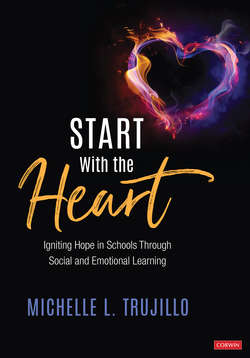Читать книгу Start With the Heart - Michelle L. Trujillo - Страница 23
На сайте Литреса книга снята с продажи.
Chapter 2 A Foundation of Love 7 Keys to Connection
ОглавлениеTelsche Hipple is a phenomenal teacher! She has a way of connecting with students that is natural, meaningful, and, in my mind, life-changing. I asked Mrs. Hipple to share an example of a student connection that was initially challenging, but ultimately significant, as well as the basis of that connection, to help my readers gain insight from a teacher’s perspective. This is her story about a student she refers to as Rees:
Rees was tough. She had an intimidating personality. She came across as knowing what she wanted and how she was going to get it. She had been expelled from school for fighting and she wore it proudly. Rees was not about to let anyone into her personal sphere. As her teacher, I didn’t have a strategy other than to let her know that I loved her and I wanted to see her succeed, and maybe even help her realize she didn’t have to fight her way through life.
I began to gain Rees’s trust a bit as I praised her efforts in her studies and let her know that I was concerned when she wasn’t at school. I thought it would help her trust me more if I shared a little bit of my life, which included a challenging time I was presently going through. I told Rees that I was taking care of my mom, with whom I was very close, because she had advancing Alzheimer’s. I then got a glimpse into Rees’s life at home as she explained that she, too, was very close with her mom. I didn’t realize our conversation meant anything to Rees until a few weeks later when she asked if she could work with my mom for her community service project that was required of all of our students. For several days after school the two of them sat together and did crafts. My mom beamed with joy because she loved working with students, and my student’s eyes and heart began to soften.
Love, through respect and a genuine interest in Rees’s life and education, helped me to chisel some necessary tough spots away to get at the heart of this amazing young woman who was hiding behind a past of hurt, loss, fighting, and betrayal. As a result, I watched her blossom as she began to develop appropriate social skills, respect herself, and achieve academically.
Mrs. Hipple said the positive change she witnessed in this student was based on love. We rarely hear the word love used in the context of educational strategies or best practices. In fact, some educators may be tempted to roll their eyes at the presentation of love as a premise for academic success. This may be a natural response, but we know that a correlation exists between connection or building relationships with our students, and academic achievement (Marzano, McNulty, & Waters, 2005; Pianta, 2001). Furthermore, wouldn’t you agree that most relationships or connections between human beings are built on love? I’m not referring to romantic love, but this is where most of our minds go when we conjure up the meaning. Perhaps this is why educators hesitate to use the word love, at least professionally, that is. Yet the idea that approaching our students and colleagues from a place of love is the cornerstone for connection.
Consider this: If love is the basis for our attitudes and our actions, it is a foundational platform on which to connect with the hearts of others in a promising and productive way. Unfortunately, many people tend to respond to life situations from a place of fear, as opposed to love. The emotion of fear leads to reservation, withdrawal, loneliness, depression, judgment, and anger; these are behaviors that do not foster relationship building, nor do they inspire effective teaching, engaged learning, productive citizens, or the academic achievement that tends to be the ultimate measure of a successful educational mission.
Love, by contrast, does all these things, because it leads to kindness, acceptance, forgiveness, joy, and hope. If given the choice, most would choose love; however, in real-life situations it is often more natural to let fear control our responses. To focus on love, one must be intentional. To do this, we must use love as a verb, an action word. Fourteen-year-old Robby Novak, known to many as the Internet sensation Kid President, has articulated this concept quite well in his quest to encourage others to change the world. He says, “[I]t takes one person filled with love and they just have to live it out, and then that person is filled with love . . . and it goes on, and on and on” (Soul Pancake, 2013).
